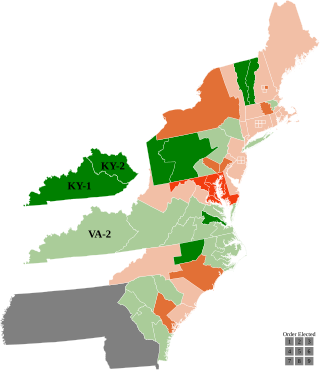| Elections in North Carolina |
|---|
 |
Following the 1790 census, North Carolina's apportionment increased from 5 to 10 seats.
| District | Incumbent | Party | First elected | Result | Candidates |
|---|---|---|---|---|---|
| North Carolina 1 | None (District created) | New seat. New member elected. Anti-Administration gain. | √ Joseph McDowell (Anti-Admin) [1] | ||
| North Carolina 2 | None (District created) | New seat. New member elected. Anti-Administration gain. | √ Matthew Locke (Anti-Admin) [1] Alexander [2] (Pro-Admin) Montford Stokes | ||
| North Carolina 3 | None (District created) | New seat. New member elected. Anti-Administration gain. | √ Joseph Winston (Anti-Admin) [1] Jesse Franklin (Anti-Admin) John Williams (Anti-Admin) James Martin Clarke [2] | ||
| North Carolina 4 | None (District created) | New seat. New member elected. Anti-Administration gain. | √ Alexander Mebane (Anti-Admin) 44.8% Stephen Moore (Pro-Admin) 39.0% Ambrose Ramsay 16.2% | ||
| North Carolina 5 | Nathaniel Macon Redistricted from the 2nd district | Anti-Administration | 1791 | Incumbent re-elected. | √ Nathaniel Macon (Anti-Admin) [1] |
| North Carolina 6 | None (District created) | New seat. New member elected. Anti-Administration gain. | √ James Gillespie (Anti-Admin) [1] William Henry Hill (Pro-Admin) Benjamin Smith | ||
| North Carolina 7 | William B. Grove Redistricted from the 5th district | Pro-Administration | 1791 | Incumbent re-elected. | √ William B. Grove (Pro-Admin) 100% [1] |
| North Carolina 8 | None (District created) | New seat. New member elected. Anti-Administration gain. | √ William J. Dawson (Anti-Admin) 63.8% Stephen Cabarrus (Anti-Admin) 36.1% William Cumming 0.2% | ||
| North Carolina 9 | John B. Ashe Redistricted from the 3rd district | Anti-Administration | 1790 | Incumbent lost re-election. New member elected. Anti-Administration hold. | √ Thomas Blount (Anti-Admin) [1] John B. Ashe (Anti-Admin) John Leigh (Pro-Admin) |
| North Carolina 10 | None (District created) | New seat. New member elected. Anti-Administration gain. | √ Benjamin Williams (Anti-Admin) [1] William Maclure (Anti-Admin) | ||




